Adolescence
Has Your Teen Developed The Basic Mental Skills for Academic Success?
Helping Your Teen Achieve Academic Success.
Posted January 26, 2011
I recently participated in a radio interview with guest Dr. Ken Gibson and host, Regina Rei Lamourelle. The interview topic was on skill sets for academic success. From time to time, I encounter writings from other professionals about the importance of intelligence, and ridiculous ways to determine how intelligent a student is. Such writings are usually supported by research studies, with obvious biases that the authors refuse to acknowledge. In my opinion the main goal of such writings about intelligence, is to associate certain ideals with status and hierarchy. Think, IQ test scores, grades, comparison between different types of students, good looks, etc..
As a psychotherapist, when I encounter students who struggle academically, I encounter two types, those who feel they are not intelligent enough to excel, and as a result don't bother making any effort past their comfort zones, and those who believe that they are intellectually superior and as a result, don't bother making any effort past their comfort zones. An interesting, humorous, yet sad irony.
The most effective method of increasingly the likelihood that your son or daughter excels academically is by viewing academic performance as being based on necessary skill sets. If you think about it, we acquire skills to function in all other aspects of our lives, from riding a bicycle, playing a sport to cooking. The same mentality towards the learning of skills is required to succeed in academia. When so much emphasis is placed on what type of brain power a student needs to possess in order to succeed, students who are exposed to this type of thinking, become easily intimidated by challenges. Yet they have encountered and navigated through challenges in other skill sets they learned.
Recently, I encountered a student with a book, it was an SAT preparation book. What was particularly unusual about this book is that it claimed any reader of the book could prepare and do well on the SAT in a period of one week. I asked the student if he had done any previous preparation for the exam, he was preparing to take in a week and a half. He shared with me that he hadn't and this was the first time he was preparing for the exam. I do want him to succeed in the exam, but I know better. While this was the first time I encountered such a book, it certainly wasn't the first time I encountered an over confident student. The sad thing is that he will likely be discouraged about his ability to attend and succeed in college if he doesn't attain the score he hopes to attain from his week and a half of cramming condensed material. The best I could do was to share with him that the average time to prepare for such an exam was three months or more, with a committed study time of an hour a day or more, then I wished him good luck.
The bottom line is this, if you have a son or daughter who is struggling academically, be cognizant not to use the words, intelligent or smart to motivate your child. Instead focus on using the words, skills and training, as part of your motivation talk. From my professional experience, I have noticed that students who excel academically have a more humble and pragmatic attitude towards their studies.
During the interview you will hear me speak briefly about intelligence being about prediction. To further expand on my point, I would say that the ability to make accurate predictions is limited by our experiences, and that our experiences are limited by the number of formal or informal skill sets we have learned. So the paradox is, by placing more emphasis on skill learning and practice, parents stand a better chance of helping their children become more intelligent.
Please visit Bam Radio, to listen to the interview.


